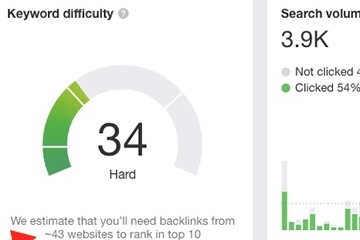Ecommerce competitors can be a good source of inspiration and ideas. Analyzing a competitor’s content — good or bad — could generate ideas for your own company’s articles, videos, podcasts, or similar.
In this post, I’ll look at a simple way to produce content marketing ideas from your competitors’ best-performing pages using Ahrefs, the search-engine-optimization tool.
Identify Competitors
If you don’t already have a list of your store’s top competitors, create one.
For example, imagine that we are about to launch an online store that sells high-end, second-hand cookware.
The company’s virtual shelves would contain gently used enamel-coated cast-iron Dutch ovens, braisers, and saucepans. The brands might include Le Creuset, Zwilling, and Cristel Castel’ Pro.
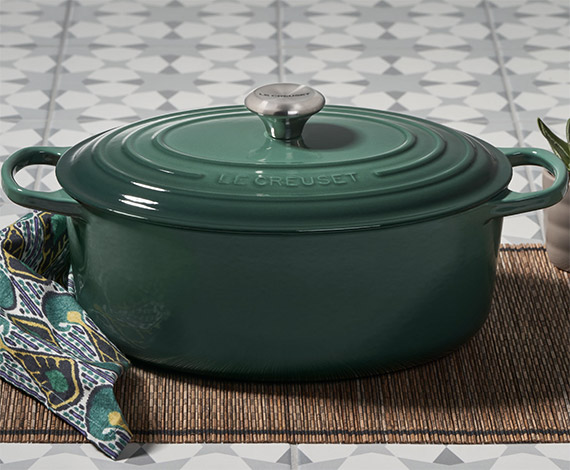
If you were selling used cookware online, your site would feature well-known brands, such as Le Creuset. Source: Le Creuset.
For the sake of generating content ideas, the aim is to find a narrow set of competitors. For example, if you search DuckDuckGo for “Le Creuset,” you could find results from the manufacturer’s website, Williams-Sonoma, Sur La Table, and Amazon.
Of these, the first three are likely good choices for our purposes as Amazon has too broad an inventory to be useful for finding cookware-related ideas.
Next, use an SEO tool, such as Ahrefs, to further identify worthy or useful competitors.
In Ahrefs, navigate to the Site Explorer tab. Enter a competitor’s domain — Surlatable.com, for example.

Ahrefs’ Site Explorer provides backlink data for individual domains. It is a starting place for both identifying competitors and finding potential topics.
The resulting page on Ahrefs includes info about the Sur La Table website, including its Ahrefs rank, a backlink count, and its estimated organic traffic.
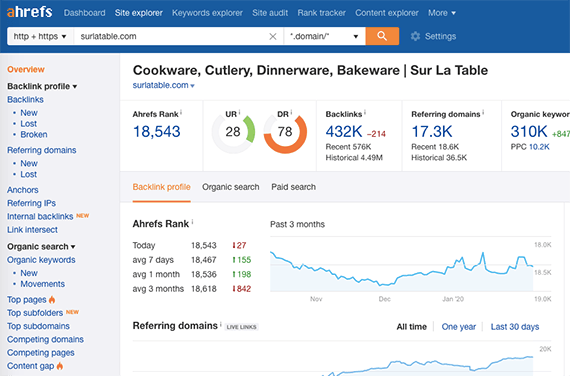
A result page from Site Explorer will be the hub from which we find information about competitors.
In the left-hand column, there is a link to the “Competing domains” report, which should help us add to a list of competitive sites from which we want to glean some content ideas.
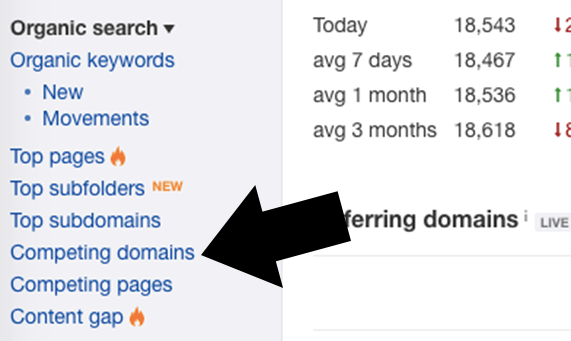
Use the “Competing domains” report to help you identify competitive stores.
Not every site on this report would make sense for our example. But we would be interested in those that have many keywords in common with Sur La Table. Don’t be surprised if you find a few blogs or online journals on the list too. These sites can also be a good source of topic ideas.

Blogs or online journals can be a good source of topic ideas in addition to ecommerce competitors.
Combine your knowledge of the industry with the companies we found on DuckDuckGo’s search results page (or Google’s) and the competing domains list in Ahrefs should produce a substantial list of competitors.
Top Pages
For each competitive site on the list, use Site Explorer. The result page is the same one we used to find competing domains. We now want the “Top pages” report — a few blue links above “Competing domains” — as it’s the next step in generating content ideas from competitors. This report will show us which pages get the most traffic for a competitor in view.
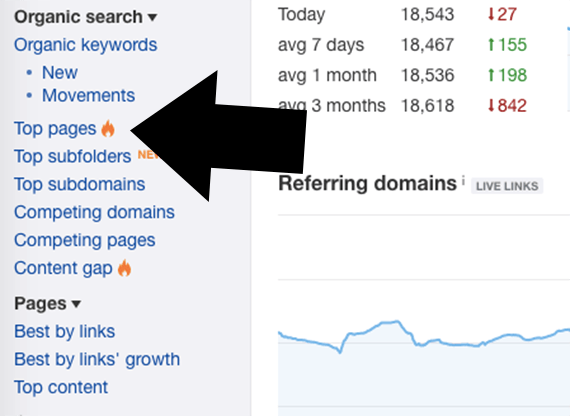
The Top pages report will show which pages get the most traffic for the competitor in view.
If we use the Top pages report for Williams-Sonoma, for example, we would find that about 7,760 visitors are hitting the store’s Le Creuset landing page from organic search results each month, making it the fifth most popular page on Williams-Sonoma’s site.
The Le Creuset page, however, is only supported by 32 referring domains, which could make it a relatively easy target. Perhaps our used cookware store should create some click-worthy content about French enameled pots.

Look for pages with a fair amount of traffic but relatively few referring domains.
Similarly, we might notice that Williams-Sonoma’s recipe landing page receives the sixth-highest organic search traffic, at 7,196 monthly visitors. Thus, we might want to include a few key recipes.
Keywords
As you repeat this process for every competitor on the list, look at the keywords associated with each of the top pages.
For example, when reviewing the top pages for the Le Creuset website, one result was a “care and use” page, which ranks for 1,001 keywords, including the phrases “season cast iron skillet” and “how to season cast iron pan.”
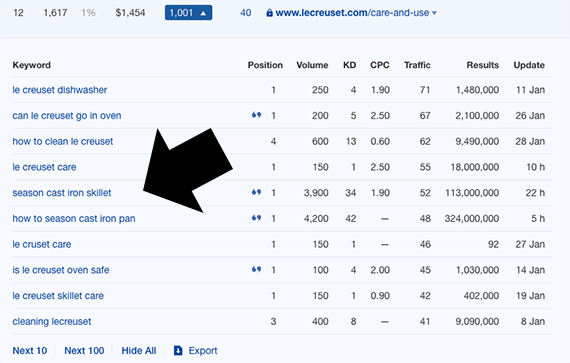
The keywords that a page ranks for could help generate article or video ideas for your ecommerce business.
Each keyword phrase in this portion of the Ahrefs’ report is a link. Click it and see detailed information. For example, the phrase “season cast iron skillet” has a keyword difficulty score of 34, meaning any content we created around seasoning skillets would need to earn approximately 43 backlinks to have a shot at breaking into the top 10 results on a Google search results page.
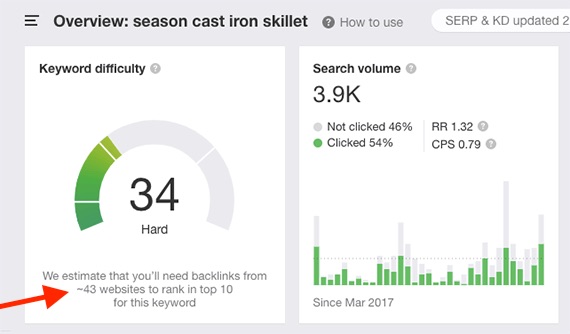
Ahrefs estimates how many backlinks you will need for your new content to rank in the top 10 search results. “Season cast iron skillet” would require 43 linking websites.
Ahrefs offers additional help a bit further down the page, listing out questions related to the keyword phrase in view. These questions could help us produce meaningful content ideas.
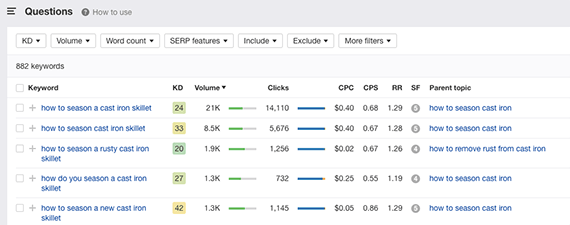
Drilling down to the questions for a specific keyword should solidify traffic-generating topic ideas.
This is especially true when combining our industry knowledge. For example, Le Creuset’s website was ranking for “how to season a cast-iron skillet,” but its products are enameled and, therefore, don’t require seasoning. So you might write an article or create a video entitled “Why you don’t need to season a Le Creuset cast-iron pan.”

